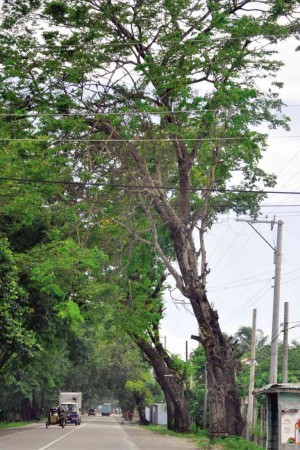
THESE trees in the Binalonan section of the Manila North Road were marked for cutting when this photo was taken on Aug. 8. WILLIE LOMIBAO/CONTRIBUTOR
DAGUPAN CITY—Former Pangasinan Rep. Mark Cojuangco on Wednesday questioned an agreement that stopped government road crews from cutting trees along the Manila North Road (MNR), which traverses his district in the eastern part of Pangasinan province.
The Department of Environment and Natural Resources (DENR), the Department of Public Works and Highways (DPWH), the Pangasinan government and environmental groups signed on Aug. 26 an agreement to spare trees marked for cutting on the MNR and to implement “immediate and effective” measures to heal and rehabilitate the remaining trees in the area.
The deal saved 770 trees on the 42-kilometer MNR stretch passing through Binalonan, Pozorrubio, Sison, Villasis and Rosales towns, and Urdaneta City.
Cojuangco, who supports the widening of the MNR, described the agreement as “a piece of toilet paper,” arguing that it was “a play on public sentiment.”
‘Just for show’
Speaking at a news conference, Cojuangco said: “This is a very questionable document. What is the personality [of those who signed the agreement]? Or is the purpose of this document just for show? Or [is it] just for public consumption that it has no legal effect at all?”
The agreement was signed by Provincial Administrator Rafael Howard Baraan, Provincial Environment and Natural Resources Officer Leduina Co, Community Environment and Natural Resources Officer Fernando Estrada Jr., Teodorico Agcolicol Jr. and Albeson Sagun of the DENR; Rex Paderes and Andres Nicer of the DPWH; Patricia Gwen Borcena of Green Research, a nongovernment organization, and Virginia Pasalo and Julia Senga, whose organizations were not indicated.
“Who are these personalities from the national agencies concerned? They are not even regional directors, usecs (undersecretaries), asecs (assistant secretaries) or secretaries,” Cojuangco said.
“As for Baraan, what was his authority to sign on behalf of the provincial government? If a provincial government enters into an agreement, should it not be the governor who should sign?” Cojuangco said.
He also criticized the DENR. “The DENR should not even involve itself in reviving the trees because it was the one that gave the permit to cut down the trees. Now, are they saying their decision was wrong? I don’t think it was a wrong decision,” he said.
The 770 trees were among the 1,829 trees that the DPWH was permitted to cut to give way to the road-widening project.
Mangatarem ignored
Environmental advocates like activist Fr. Robert Reyes first drew attention to the fate of the trees in December 2013, igniting a campaign to rescue trees endangered by national government projects.
“I learned that thousands of trees were felled in the mountains of Mangatarem [town] to open a new road [to Zambales province] and it had no permit. But why is it that no complaint was heard [against] these officials?” Cojuanco said.
He was referring to the 2009 cutting of more than 200 trees and the 2012 cutting of more than 3,000 trees in a patch of forest in Mangatarem for a new road that would connect the province to Zambales. That road project did not secure a tree-cutting permit.
“Why didn’t Fr. Robert Reyes go to the forests of Mangatarem because the tree cutting there was illegal and didn’t have permits?” he said.